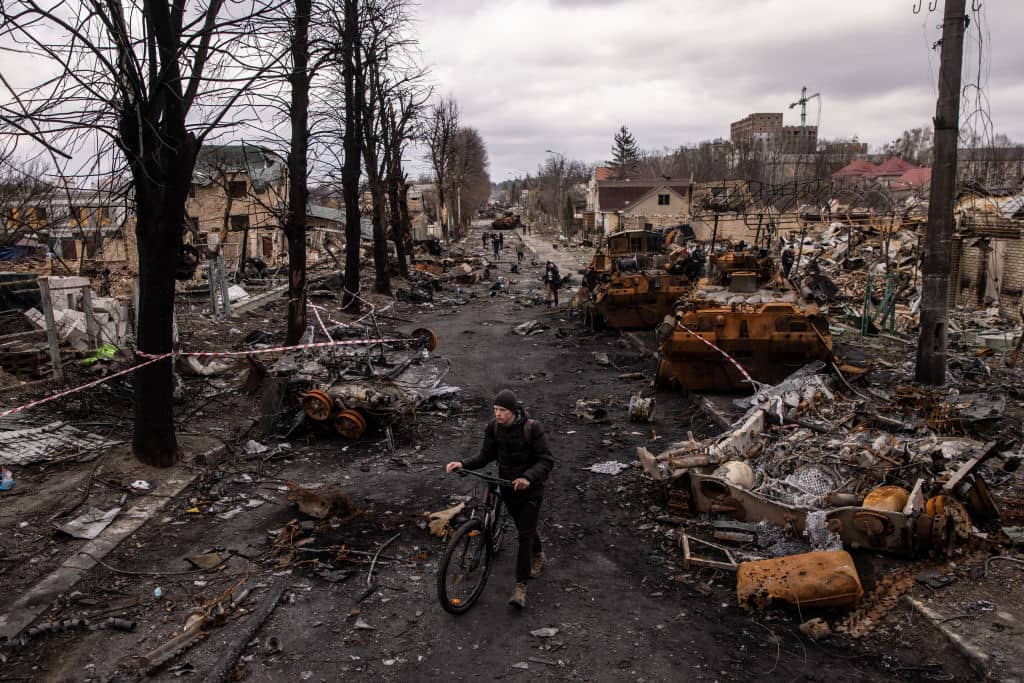Ukrainian victims of Russia’s war have taken to calling their invaders ‘orcs’. The word is familiar to JRR Tolkien readers as the name given to the monstrous anthropoids in his epic novel ‘The Lord of the Rings’. In all Tolkien’s stories of the wars in Middle Earth, orcs are violent, destructive and untrustworthy, wreaking wanton havoc wherever they go. It is not hard to see why the people of Ukraine use this name for the invaders of their land.
But although Tolkien made the word his own, its origins are, as he acknowledged himself, much older. Orcs first appeared in a tenth-century glossary written in Old English (Anglo-Saxon) and, more famously, in line 112 of the Old English poem Beowulf: ‘Eotenas ond ylfe ond orcneas’.
Today’s ‘orcs’ wreaking havoc in the towns and villages of Ukraine appear to have this in common with their fictional predecessors
In both cases, the word appears as an item in a list of the names of creatures. In Beowulf, it can be translated as ‘ogres and elves and monsters’. But apart from that context there is little to explain what orcs were (or are). One possible clue linguists have picked up on is that ‘orcneas’ combines the word ‘orc’ with another word ‘neas’ that seems to mean ‘corpses’.
Its origins then suggest a possible link to the undead. But the elusive search for the meaning of the word is likely to be what attracted Tolkien to it in the first place. Tolkien was fascinated by words in ancient languages, including Old English, for which there were no definite meanings; he enjoyed trying to puzzle out clearer definitions. In this he was part of the scholarly tradition of philology: the academic study of the roots and derivations of words and languages. Undoubtedly he was drawn to the word ‘orc’ by the obscurity of its meaning.
What is certain is that orcs were characters Tolkien returned to repeatedly. While orcs are not named as such in ‘The Hobbit’ (1937) – instead they are called ‘goblins’ – they embody most of the characteristics of the orcs shown more fully in ‘The Lord of the Rings’ (1954-55). Earlier in Tolkien’s writings, in tales of the elves of Middle Earth – none of which were published until ‘The Silmarillion’, edited in 1977 by his son Christopher, four years after Tolkien’s death – they appear for the first time. In a section entitled ‘Of the Coming of the Elves and the Captivity of Melkor’ in ‘Quenta Silmarillion’, we are told that the evil demigod Melkor (later renamed Morgoth, predecessor of Sauron) turned elves captured in war into orcs by torture. They were then bred into armies of savage and merciless followers, some of whom appear in ‘The Lord of the Rings’ as the captors first of the hobbits Pippin and Merry, and then of the second pair, Frodo and Sam. The orcs treat the hobbits with callous cruelty and contempt, while showing much the same feelings to each other.
Today’s ‘orcs’ wreaking havoc in the towns and villages of Ukraine appear to have this in common with their fictional predecessors. Yet there may be something more to Ukrainians calling Russians ‘orcs’ than it being merely a term of casual abuse. When ‘The Lord of the Rings’ became a worldwide bestseller it was translated into many languages and inspired countless imitations. In Russia, Kirill Eskov published a retelling of Tolkien’s work in 1999 under the title ‘The Last Ringbearer’. Eskov’s novel is a mirror-image of Tolkien’s. It follows a group of elves, led by Gandalf, who wage unremitting war on the peaceful realm of Sauron; eventually Sauron succeeds in defeating them and destroys their treacherous magic, ushering in a new age of progress and prosperity.
‘The Last Ringbearer’ is not the first or the only inversion of the morality of ‘The Lord of the Rings’, but it is striking in its readiness to identify with Sauron and his orcs against elves, dwarves and humans. It is hard in 2022 to resist seeing a parallel with Vladimir Putin’s vision of Russia assailed by the West and driven to a self-righteous war of survival against a hostile world. On the other side, the people of Ukraine, not deluded by Eskov, label Putin and his troops the orcs they are.






Comments